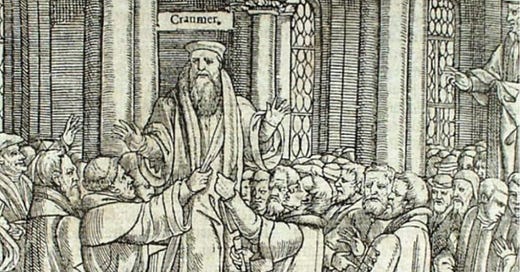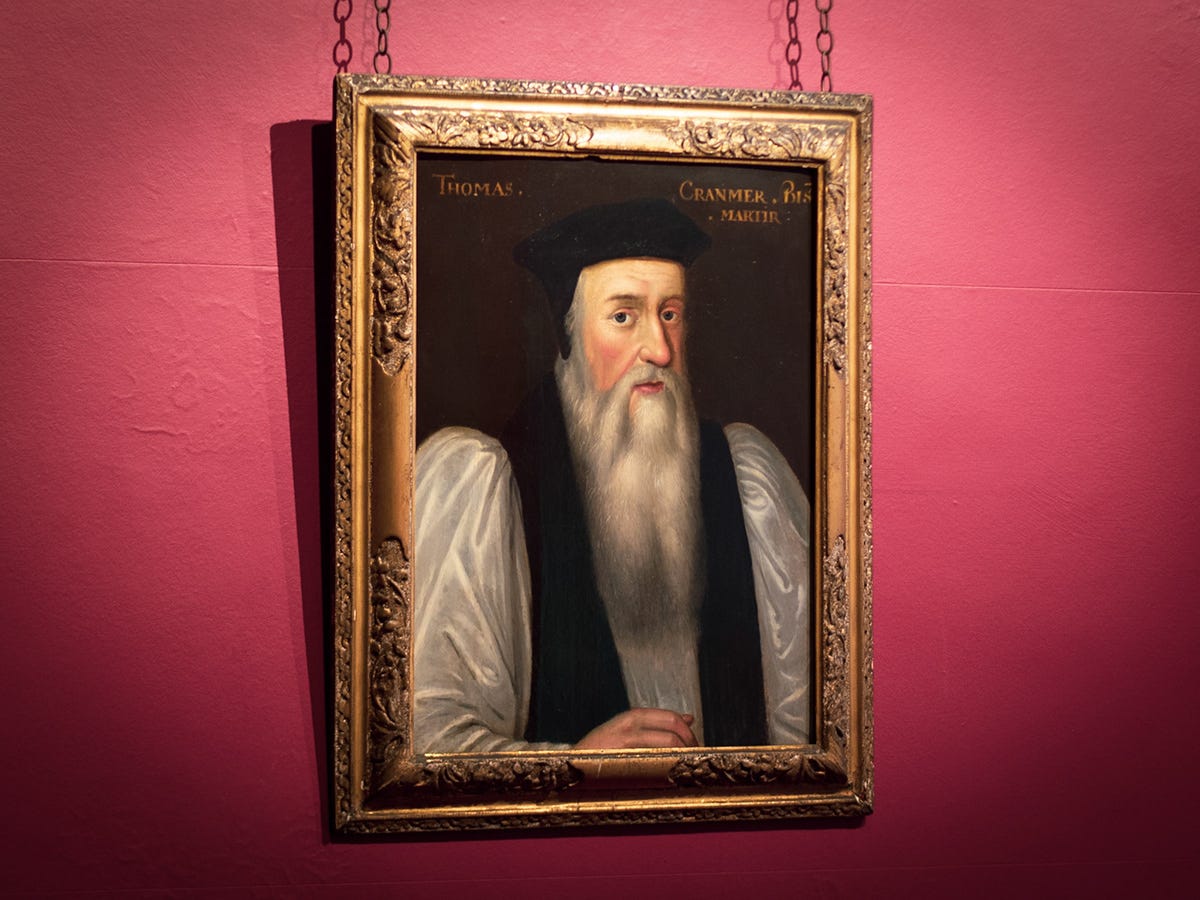The Collect for Purity: All Hearts Be Open
Part One: A Summer Series on the Enduring Words of Thomas Cranmer
Almighty God, to you all hearts are open, all desires known, and from you no secrets are hid: Cleanse the thoughts of our hearts by the inspiration of your Holy Spirit, that we may perfectly love you, and worthily magnify your holy Name; through Christ our Lord. Amen.
(BCP 2019, pp. 106 & 124)
A Brief Addendum to this Post on the Collect for Purity
A few sharp-eyed readers have rightly noted: Thomas Cranmer didn’t actually write the Collect for Purity. The original Latin form is often attributed to Alcuin of York, an 8th-century churchman and scholar in the court of Charlemagne.
Thank you for sending me back to my study—on vacation!
But still, Cranmer chose it. He translated it. And most importantly, he placed it—right at the beginning of the Communion liturgy in 1549, moving it from a quiet, private devotion of the priest to a shared prayer of the whole people of God.
If Alcuin planted the seed, Cranmer gave us the fruit—ripened in the rhythms of English.
Besides, what is truly original in the Church? The best things are always received, not invented.
Cranmer’s gift was not novelty, but wisdom: he gave ancient words a lasting voice. And by his hand, the Church still prays them today.
Now, back to the original post here.
The Dangerous Prayer
We must first acknowledge that this prayer—the Collect for Purity—asks the most fearful question imaginable:
Is it true?
Does God really know everything about me—without my saying a word, thinking a thought, or offering an excuse?
It is a staggering question.
I have said Cranmer’s signature prayer hundreds—even thousands—of times, sitting in congregations or serving at the altar as a young acolyte. It is the opening line to the Order of Holy Communion. Many would agree it qualifies as a prime example of poetic beauty and sublime faith in a long list of Cranmerian offerings.
👉🏻(BTW, the way you say Collect is with an emphasis on the first syllable. (“Collect,” pronounced KOL-ekt, not “kuh-LEKT”))
In this summer series at The Anglican, I hope to read, mark, learn, and inwardly digest (another Cranmerism) the well-known words of the English Anglican reformer, Thomas Cranmer. His five-hundred-year-old prayers and phrases still fill our lexicon today. Here are just a few entries in a long list of hits:
To have and to hold… (Marriage)
We have erred and strayed… (General Confession)
Earth to earth, ashes to ashes… (Burial of the Dead)
The Comfortable Words (four NT passages)
We are not worthy so much as to gather up the crumbs… (Prayer of Humble Access)
And on it goes.
Cranmer’s great achievement—his magnum opus—was the Book of Common Prayer, that red or black thick treasure trove in your pew rack, seat back, or excerpted in the weekly handouts in many Anglican congregations. The BCP, as it is known, defines Anglicanism around the world.
Anglicanism is/was the second-largest non-Roman Catholic denomination in the world, with Pentecostalism taking the lead spot.
But what holds us together—if we can say we are held together at all any longer?
I would have said it is the Book of Common Prayer. I think our investment in and use of the BCP is what defines Anglicanism.
My good friend Chuck Collins, a fellow priest in the ACNA, former Rector, and amateur historian of all things Cranmer, would say otherwise. Cranmer hoped that the Bible would hold us together—the daily reading of Scripture in a church (through the Daily Office) and at home would be the mark of an Anglican.
Let’s examine this in the weeks to come and find out.
Thomas Cranmer
So, what about Thomas Cranmer? (b. 1489; d 1552) As much as I love the Anglican Church—and have been part of it for almost my entire life— my mother first took me there in 8th grade; before that, she had been a Unitarian! More on that later—as much as I love it, I hardly know Thomas Cranmer.
But I intend to fix that this summer. And I’d like you to join me.
Over the next two months, let’s examine the heart, soul, and mind of Anglicanism as conceived by its originator and founder, Thomas Cranmer.
As we go through the great lines and literature Cranmer penned and produced, I’ll share what I’m discovering about the man, the first and most celebrated Archbishop of Canterbury.
(About the photo) I took this photo over a decade ago at Lambeth Palace. The portrait hangs quietly in a side hall just off the main library—a modest placement for a man of such enduring influence. Painted by an anonymous artist around 1547, it captures Cranmer at the beginning of Edward VI’s reign, marked by the first signs of his now-iconic beard. The beard wasn’t mere fashion—it signaled a turning point in the English Reformation and Cranmer’s increasing confidence in Protestant reform. The painting, like the man, deserves a more prominent place.
The Collect for Purity
On February 5, 1983, I stood at the altar for the first time as a newly minted priest—clothed in borrowed vestments and trembling with nervous fear. The setting was Christ the King Episcopal Church in Tucson, Arizona.
When I came to the Collect for Purity—saying it aloud, alone, on behalf of the people gathered—I choked a bit. Not from nerves, though those were present. I choked because of the weight of the words.
Almighty God, to you all hearts are open, all desires known, and from you no secrets are hid…
I had prayed it before, many times. But never like this. Never as the one offering it on behalf of the people. Never with the awareness that I was saying something so astonishing, so exposing, and yet—so hopeful.
That first line is a theological earthquake:
Not some hearts. All hearts.
Not just known desires. Every one.
Not hidden from others. Not hidden from God.
This prayer is often said today in unison—priest and people together. But for centuries, it was a solo act, whispered privately by the priest before the Mass began.
Cranmer brought it forward and into the open.
The First Thing We Say
The opening sentence of Anglican worship does not begin with a song, a sermon, or a Scripture reading.
The Order for Holy Communion begins with an admission.
A bold confession:
God already knows.
God already sees.
And we cannot begin to worship Him rightly until we admit that.
It is a prayer of honesty, humility, and holy anticipation.
The name Collect for Purity may sound antique to modern ears. The word purity has acquired baggage over the centuries. It reminds us of a politically incorrect, often maligned, and misunderstood group of faithful Christians: Puritans.
It can sound moralistic or prudish, almost unreachable. But in this context, purity doesn’t mean flawlessness—it means focus. It means a heart made clear. A soul unclouded by fear, shame, or distraction. In biblical terms, it means singleness of heart.
“Blessed are the pure in heart,” Jesus said, “for they shall see God.”
That’s what this Collect dares to ask:
That God would clear the fog.
Cleanse the thoughts.
Refine the love.
So that we might perfectly love Him and worthily magnify His holy Name.
Good News or Bad News?
If we are honest about this admission, it is either a good thing—or a terrifying one. If God knows everything about me, all the time, all at once, how could I stand?
Isn’t that what David, the King of Israel, asked of God?
If you, O LORD, should mark iniquities, O Lord, who could stand? —Psalm 130:3
It is an incredible statement that God would know the secrets of my thoughts and heart. King David said as much in his day, a thousand years before Jesus was born:
You have searched me, Lord, and you know me.
You know when I sit and when I rise;
you perceive my thoughts from afar…
Before a word is on my tongue, you, Lord, know it completely.
—Psalm 139:1–4
The Collect for Purity begins with the statement that we are known—truly known by God—and knowing how deeply we are known is uncomfortable.
We’ve all felt the fear of being watched. Cranmer says we are more than watched. We are profoundly and inexorably known by God.
So, is that good news or bad?
Tell me what you think. Leave a comment.
⸻⸻
(Please join our Premium Level for $8/month or $80 a year. Do the math. I usually write three posts a week, that’s 12 a month, for $8. Way less than a dollar (around 67 cents!)
⸻⸻
The Creepy Eye of Sauron?
Keep reading with a 7-day free trial
Subscribe to The Anglican to keep reading this post and get 7 days of free access to the full post archives.







